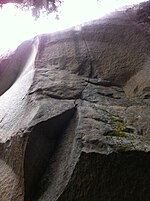CISQ-FM
1981 establishments in British ColumbiaHot adult contemporary radio stations in CanadaRadio stations established in 1981Radio stations in British ColumbiaRogers Communications radio stations
CISQ-FM (107.1 MHz) is a radio station owned by Rogers Radio, a division of Rogers Sports & Media, and operating in southwestern British Columbia. It broadcasts at 107.1 MHz in Squamish and 102.1 MHz in Whistler. It broadcasts an adult contemporary format branded as Mountain FM.
Excerpt from the Wikipedia article CISQ-FM (License: CC BY-SA 3.0, Authors).CISQ-FM
Tree Hugger, Squamish Northridge
Geographical coordinates (GPS) Address Nearby Places Show on map
Geographical coordinates (GPS)
| Latitude | Longitude |
|---|---|
| N 49.708333333333 ° | E -123.13444444444 ° |
Address
Tree Hugger
Tree Hugger
V8B 0X5 Squamish, Northridge
British Columbia, Canada
Open on Google Maps








